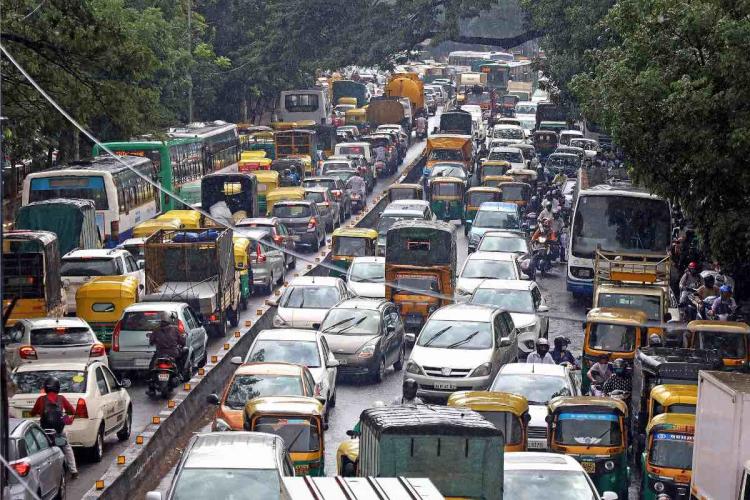Bengaluru: The Karnataka government has submitted in affidavits filed before the High Court that it was not necessary to change school timings and working hours in factories to control traffic in Bengaluru as they were not the only causes for congestion. The affidavits by the Education and Labour Departments were filed after extensive consultation with stakeholders. The HC recorded the submission and adjourned the hearing of the PIL to January first week.
In the affidavit filed by the Principal Secretary of the Department of School Education and Literacy, Ritesh Kumar Singh, it has been stated that there was no need for any changes in school timings in Bengaluru. The report said that the traffic congestion is not solely due to school hours but is affected by the overall movement of vehicles to and from various institutions, industries, and other locations. Initiating changes in school timings without addressing the overall traffic scenario may lead to adverse consequences, disrupting the scheduled time for sleep, meals, and other essential activities for the students, the affidavit said.
ALSO READ: "Beta Padhao, Beti Bachao," says HC on Belagavi stripping and assault case
However, suggestions for decongesting roads near school and colleges were provided in the affidavit including specifying designated pickup and drop points for students, deploying traffic police and wardens during the school commencement and conclusion time and providing Bangalore Metropolitan Transport Corporation (BMTC) bus services for students.
The affidavit by Principal Secretary, Department of Labour, Mohammad Mohsin stated that there was no need to change the working hours in factories as they were not the sole cause of traffic congestion. The affidavit states that workers travel between 6 am and 9 am and travel back after working hours.
The State has however suggested several measures to avoid traffic congestion including encouraging hybrid working by companies on the Outer Ring Road. The affidavit was filed in response to the recommendations given by the High Court regarding the modification of school, college, and factory timings to regulate traffic congestion in the city. The PIL filed by 'Samarpana Trust' was heard by Chief Justice Prasanna B Varale and Krishna S Dixit.
Let the Truth be known. If you read VB and like VB, please be a VB Supporter and Help us deliver the Truth to one and all.
Panaji (PTI): As part of a crackdown against tourist establishments violating laws and safety norms in the aftermath of the Arpora fire tragedy, Goa authorities on Saturday sealed a renowned club at Vagator and revoked the fire department NOC of another club.
Cafe CO2 Goa, located on a cliff overlooking the Arabian Sea at Vagator beach in North Goa, was sealed. The move came two days after Goya Club, also in Vagator, was shut down for alleged violations of rules.
Elsewhere, campaigning for local body polls, AAP leader Arvind Kejriwal said the fire incident at Birch by Romeo Lane nightclub at Arpora, which claimed 25 lives on December 6, happened because the BJP government in the state was corrupt.
An inspection of Cafe CO2 Goa by a state government-appointed team revealed that the establishment, with a seating capacity of 250, did not possess a no-objection certificate (NOC) of the Fire and Emergency Services Department. The club, which sits atop Ozrant Cliff, also did not have structural stability, the team found.
The Fire and Emergency Services on Saturday also revoked the NOC issued to Diaz Pool Club and Bar at Anjuna as the fire extinguishers installed in the establishment were found to be inadequate, said divisional fire officer Shripad Gawas.
A notice was issued to Nitin Wadhwa, the partner of the club, he said in the order.
Campaigning at Chimbel village near Panaji in support of his party's Zilla Panchayat election candidate, Aam Aadmi Party leader Kejriwal said the nightclub fire at Arpora happened because of the "corruption of the Pramod Sawant-led state government."
"Why this fire incident happened? I read in the newspapers that the nightclub had no occupancy certificate, no building licence, no excise licence, no construction licence or trade licence. The entire club was illegal but still it was going on," he said.
"How could it go on? Couldn't Pramod Sawant or anyone else see it? I was told that hafta (bribe) was being paid," the former Delhi chief minister said.
A person can not work without bribing officials in the coastal state, Kejriwal said, alleging that officers, MLAs and even ministers are accepting bribes.





